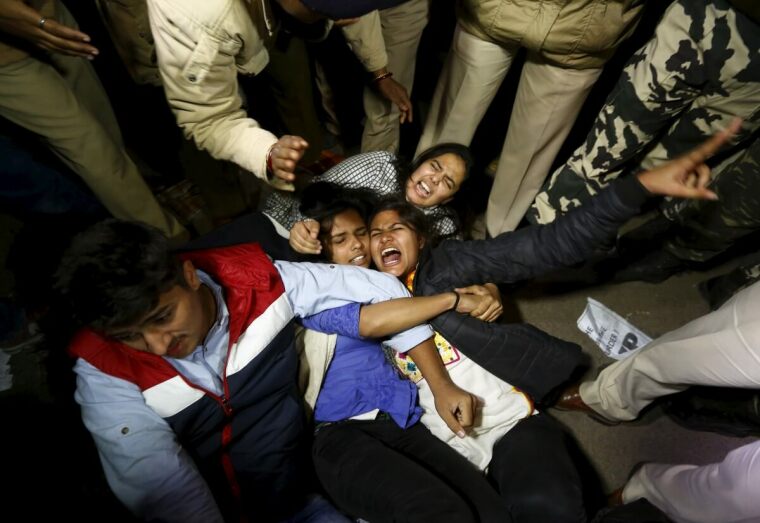India lowers crime trial age to 16 after Delhi gang rape furor

India passed legislation lowering the age at which someone can be tried for rape and other crimes to 16, spurred into action by an uproar over the release of a minor convicted in a 2012 fatal gang rape of a 23-year-old woman on a Delhi bus.
Parents of the victim had led demand for amendments to the law after their daughter was repeatedly raped and beaten by the 17-year-old minor as well as five adult companions. The woman died of her injuries two weeks later at a Singapore hospital.
Four adults in the case, which drew worldwide condemnation, were sentenced to death while the fifth hanged himself in prison. The death penalties have yet to be carried out.
Women and Child Development Minister Maneka Gandhi said on Tuesday the legislation aimed to strike a balance between the rights of a child and the need to deter heinous juvenile crimes, especially against women.
"Juvenile crime is the fastest rising segment in the country and the bill will help to stop (this)," she said. "The new law will decide whether a child committed the crime in a childish or adult frame of mind."
India's upper house of parliament passed the Juvenile Justice (Care and Protection of Children) Bill by a voice vote, paving the way for lowering the minimum age for a criminal trial to 16 from 18, depending on the gravity of the offense.
The lower house had already passed the bill. It will become law once President Pranab Mukherjee signs it, likely a formality.
Current law defines a person under 18 as a juvenile and caps punishment at three years in a correctional home. Under the new law, 16- and 17-year-olds can be tried as adults, with corresponding sentences of up to life in prison or even the death penalty, depending on the severity of the crime.
The release last Sunday of the teenager involved in the 2012 gang rape sparked street protests by students and the victim's mother, Asha Devi. Police had accused the teenager of gory violence, including pulling out a part of the woman's intestines with his hands.
"I understand that a change in law will not affect my daughter's case, but a serious crime even if it is committed by a minor should not be overlooked," Devi said before the legislation was adopted.
India's National Crime Records Bureau data shows that 16- to 18-year-olds account for a majority of minors arrested for crimes but activists said the latest amendment violated child rights and would not stem sex crimes.
"Lawmakers have committed a blunder by changing the law," said Shahbaz Khan, program coordinator at Haq, a center for child rights in New Delhi. "They have taken an emotional decision and only children will suffer the most."
 Christians don't have to affirm transgenderism, but they can’t express that view at work: tribunal
Christians don't have to affirm transgenderism, but they can’t express that view at work: tribunal Archaeology discovery: Medieval Christian prayer beads found on Holy Island
Archaeology discovery: Medieval Christian prayer beads found on Holy Island Presbyterian Church in America votes to leave National Association of Evangelicals
Presbyterian Church in America votes to leave National Association of Evangelicals Over 50 killed in 'vile and satanic' attack at Nigerian church on Pentecost Sunday
Over 50 killed in 'vile and satanic' attack at Nigerian church on Pentecost Sunday Ukrainian Orthodox Church severs ties with Moscow over Patriarch Kirill's support for Putin's war
Ukrainian Orthodox Church severs ties with Moscow over Patriarch Kirill's support for Putin's war Islamic State kills 20 Nigerian Christians as revenge for US airstrike
Islamic State kills 20 Nigerian Christians as revenge for US airstrike Man who served 33 years in prison for murder leads inmates to Christ
Man who served 33 years in prison for murder leads inmates to Christ


 Nigerian student beaten to death, body burned over ‘blasphemous’ WhatsApp message
Nigerian student beaten to death, body burned over ‘blasphemous’ WhatsApp message 'A new low': World reacts after Hong Kong arrests 90-year-old Cardinal Joseph Zen
'A new low': World reacts after Hong Kong arrests 90-year-old Cardinal Joseph Zen Iran sentences Christian man to 10 years in prison for hosting house church worship gathering
Iran sentences Christian man to 10 years in prison for hosting house church worship gathering French Guyana: Pastor shot dead, church set on fire after meeting delegation of Evangelicals
French Guyana: Pastor shot dead, church set on fire after meeting delegation of Evangelicals ‘Talking Jesus’ report finds only 6% of UK adults identify as practicing Christians
‘Talking Jesus’ report finds only 6% of UK adults identify as practicing Christians Mission Eurasia ministry center blown up in Ukraine, hundreds of Bibles destroyed: 'God will provide'
Mission Eurasia ministry center blown up in Ukraine, hundreds of Bibles destroyed: 'God will provide' Church holds service for first time after ISIS desecrated it 8 years ago
Church holds service for first time after ISIS desecrated it 8 years ago Burger King apologizes for 'offensive campaign' using Jesus' words at the Last Supper
Burger King apologizes for 'offensive campaign' using Jesus' words at the Last Supper Uganda: Muslims abduct teacher, burn him inside mosque for praying in Christ’s name
Uganda: Muslims abduct teacher, burn him inside mosque for praying in Christ’s name